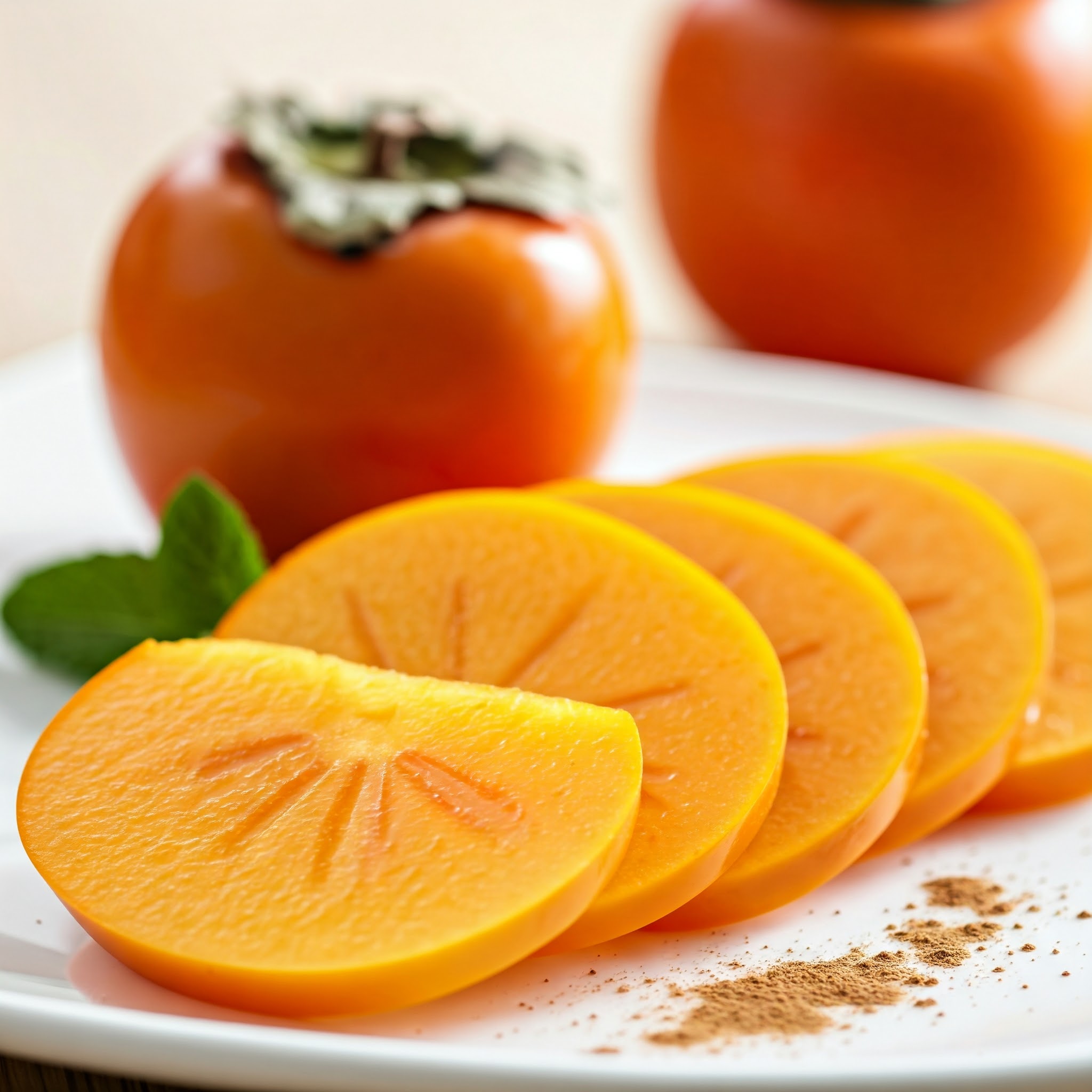Report as a Problem
Have any problem, Report to us.
persimmon (रामफल)
Ramphal
- Here Tags (health Related)
About persimmon A Ingredients
Persimmon: The Golden Jewel of Nature
Bright, vibrant, and irresistibly sweet, the persimmon stands as nature’s golden jewel. With its deep orange hue and smooth, honey-like flavor, this delightful fruit captures the essence of autumn and winter in every bite. Whether enjoyed fresh, blended into smoothies, or added to your favorite desserts, persimmon adds a luxurious sweetness to any dish. It’s not just about the taste, though; persimmons are a treasure trove of health benefits. Packed with antioxidants, fiber, and vitamins, they strengthen your immune system, promote digestive health, and keep your skin glowing. The rich, subtle sweetness and juicy texture make it a perfect snack or a flavorful addition to your meals.
To Include persimmon in your daily menu, logon to planmeal.com
Its rich flavor pairs wonderfully with a variety of ingredients, from nuts to yogurt, or even added to a warm bowl of oatmeal. Versatile and easy to incorporate, persimmon complements both savory and sweet dishes, making it a must-have in any healthy diet. It’s a perfect fruit to add to your weekly plan, especially for those seeking a burst of vitamins and flavor to brighten their meals.
Sweeten your meals, sweeten your life!
How Important is Persimmon?
Persimmon is an incredibly nutritious fruit, valued for its high content of vitamins, minerals, and antioxidants. It is a rich source of Vitamin C, which helps boost the immune system and protect against free radicals. The fruit also contains dietary fiber, supporting digestive health and aiding in weight management.
In addition to its health benefits, persimmon is a versatile fruit, easily incorporated into a variety of dishes such as smoothies, salads, and desserts. Its natural sweetness makes it a healthy alternative to added sugars. With its vibrant color and rich taste, persimmon also offers a delightful addition to your diet.
Including persimmon in your meals can support overall well-being, providing essential nutrients that help improve skin health, digestion, and heart function.
Persimmon: The Golden Jewel of Nature
Bright, vibrant, and irresistibly sweet, the persimmon stands as nature’s golden jewel. With its deep orange hue and smooth, honey-like flavor, this delightful fruit captures the essence of autumn and winter in every bite. Whether enjoyed fresh, blended into smoothies, or added to your favorite desserts, persimmon adds a luxurious sweetness to any dish. It’s not just about the taste, though; persimmons are a treasure trove of health benefits. Packed with antioxidants, fiber, and vitamins, they strengthen your immune system, promote digestive health, and keep your skin glowing. The rich, subtle sweetness and juicy texture make it a perfect snack or a flavorful addition to your meals.
To Include persimmon in your daily menu, logon to planmeal.com
Its rich flavor pairs wonderfully with a variety of ingredients, from nuts to yogurt, or even added to a warm bowl of oatmeal. Versatile and easy to incorporate, persimmon complements both savory and sweet dishes, making it a must-have in any healthy diet. It’s a perfect fruit to add to your weekly plan, especially for those seeking a burst of vitamins and flavor to brighten their meals.
Sweeten your meals, sweeten your life!
How Important is Persimmon?
Persimmon is an incredibly nutritious fruit, valued for its high content of vitamins, minerals, and antioxidants. It is a rich source of Vitamin C, which helps boost the immune system and protect against free radicals. The fruit also contains dietary fiber, supporting digestive health and aiding in weight management.
In addition to its health benefits, persimmon is a versatile fruit, easily incorporated into a variety of dishes such as smoothies, salads, and desserts. Its natural sweetness makes it a healthy alternative to added sugars. With its vibrant color and rich taste, persimmon also offers a delightful addition to your diet.
Including persimmon in your meals can support overall well-being, providing essential nutrients that help improve skin health, digestion, and heart function.
Check out these 1 recipes of persimmon on Planmeal
Nutrients present in persimmon from <%= data.category.name %> Group
| Label | Value |
|---|---|
| Calories | 81 Kcal |
| Protein | 0 g |
| Carbohydrates | 33.5 g |
| Fat | .2 g |
| Dietary Fiber | N/A g |
| Vitamin A | 81 μg |
| Vitamin C | 66.0 mg |
| Calcium | 8 mg |
| Iron | .3 mg |
Here are some Alternatives/ substitutes of persimmon which can be kept in mind while meal planning for the week

Complete Micro Nutritional values of persimmon, Please log in/ signup to view.
रामफल के संपूर्ण पोषक तत्व जानने के लिए, कृपया लॉग इन या प्लानमील पर साइनअप करें
More Details of persimmon
 How to Store persimmon
How to Store persimmon
How to Store Persimmon:
To store persimmons, first allow them to ripen at room temperature if they are not already ripe. Place them in a cool, dry spot away from direct sunlight for 3-4 days. Once ripe, you can store them in the refrigerator to extend their shelf life up to 3-4 weeks. For unripe persimmons, leave them on the countertop in a paper bag or on a flat surface until they soften. If you want to store them for a longer period, consider freezing persimmons after peeling and slicing them. This way, you can preserve their flavor for months.
 Shelf life of persimmon
Shelf life of persimmon
Shelf Life of Persimmon:
Fresh persimmons typically last 1-2 weeks at room temperature when ripe. If stored in the refrigerator, they can last up to 3-4 weeks. Unripe persimmons can be kept at room temperature for 3-4 days until ripened.
 What/How to check persimmon before buying
What/How to check persimmon before buying
How to Check Persimmon Before Buying
When buying persimmon, it’s essential to pick fruits that are ripe and of good quality. Check the color of the fruit—ripe persimmons have a vibrant, deep orange color, while under-ripe ones may appear pale yellow or greenish. Gently press the fruit with your fingers; ripe persimmons should feel soft, especially for varieties like the Fuyu or Hachiya. If the fruit is hard, it may need a few days to ripen at room temperature. Be cautious of any bruises, dark spots, or cracks on the skin, as these can indicate damage or over-ripeness.
Another way to check is by sniffing the fruit. A sweet, floral aroma is a sign of ripeness, while a lack of scent may indicate under-ripeness. The skin of the persimmon should be smooth and unblemished. Lastly, avoid overly squishy persimmons unless you plan to use them quickly, as they may not last long.
When to Buy Persimmons in Bulk
The best time to buy persimmons in bulk is during the peak season, which generally runs from October to February. During this period, persimmons are fresh, in abundance, and often more affordable. If you plan to store them, purchase when they are slightly under-ripe, allowing you to ripen them at home.
Best Season for persimmon is: January , February , October , November and December
Plan meal Tips to improve your daily diet to help you save time, money and achieve health goals.

Meal Planning Tip # 2
Start Small
start with a small change/ steps with Planmeal to change your eating habits, which will give you long term success





